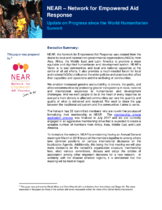This site is inactive as of February 2020. For updated information on an initiative's work, please refer to their own website as listed in their contact details.
Summary
Local people and organizations are often the fastest to react in a crisis – their local knowledge and ingenuity can save lives in an emergency, or find effective solutions to longer-term challenges. But local voices are often not given the attention they deserve in these situations – large international organizations often take priority over smaller local groups.
NEAR, the Network for Empowered Aid Response, has been created from the desire by local and national NGOs from Asia, Africa, the Middle East and Latin America to promote a more equitable and dignified humanitarian and development system. NEAR wants to see communities and local and national capacities at the centre of all aid efforts. It also provides a much-needed forum for local and national NGOs to influence the wider policies and practices that affect their capacities and operations and the wellbeing of communities.
Partners
The NEAR network consists of local and national organizations who have deep roots and credibility in local communities, and are united by the goal of making sure effective aid is delivered to people in need. Most of our members so far are from Africa, Asia, and Middle East which are some of the most vulnerable areas. A list of all the member organisations can be found here: https://near.ngo/our-reach

Goals
NEAR aims to reshape the top-down humanitarian and development system to one that is locally driven and owned, and is built around equitable, dignified and accountable partnerships. It wants to close the gap between the traditional aid system and the communities it aims to serve and to increase accountability to donors, the public, and affected communities by promoting greater transparency in local, national and international responses to humanitarian and development challenges.
To help improve the capacity and preparedness of local communities, NEAR will focus on four main areas of work: advocacy, financing, organizational development and research.
Resources





 summary
summary partners
partners goals
goals Stakeholder reports
Stakeholder reports resources
resources contacts
contacts
